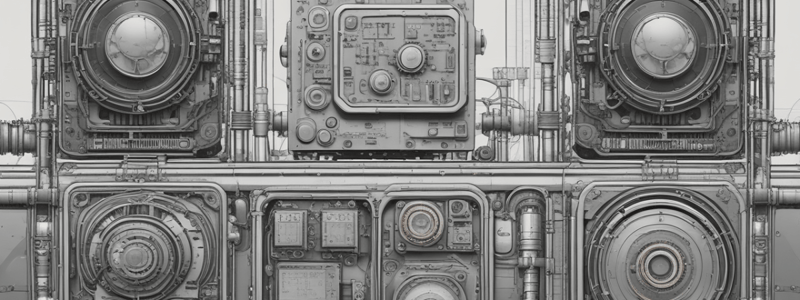Podcast
Questions and Answers
Why is a slight negative pressure value always included in a pressure range?
Why is a slight negative pressure value always included in a pressure range?
- To reduce the transmitter's sensitivity
- To ensure the transmitter is always active
- To increase the transmitter's calibration range
- To detect leaks or changes in the tank's shape (correct)
If a tank is calibrated to minus five to 25 psi, what is the pressure at halfway?
If a tank is calibrated to minus five to 25 psi, what is the pressure at halfway?
- 12.5 psi
- 15 psi
- 10 psi (correct)
- 20 psi
What type of input would the pressure transmitter typically be?
What type of input would the pressure transmitter typically be?
- Analog input (correct)
- Hydraulic input
- Pneumatic input
- Digital input
Why is a four to 20 milliamp current used in analog inputs, rather than zero to 20 milliamps?
Why is a four to 20 milliamp current used in analog inputs, rather than zero to 20 milliamps?
What is the purpose of the transmitter in an analog input system?
What is the purpose of the transmitter in an analog input system?
What is the role of the analog input controller card in the process of converting an analog input to a digital value?
What is the role of the analog input controller card in the process of converting an analog input to a digital value?
What is the relationship between the level of a tank and the current output of the level sensor?
What is the relationship between the level of a tank and the current output of the level sensor?
In the context of analog inputs, what does the term "sampling" refer to?
In the context of analog inputs, what does the term "sampling" refer to?
What is the primary reason for using an analog-to-digital (A/D) converter in an analog input system?
What is the primary reason for using an analog-to-digital (A/D) converter in an analog input system?
Why is it important to sample the analog signal frequently enough in an analog input system?
Why is it important to sample the analog signal frequently enough in an analog input system?
What is the relationship between the milliamp reading and the tank level?
What is the relationship between the milliamp reading and the tank level?
What determines the range of digital values that can be represented by a 12-bit A/D converter?
What determines the range of digital values that can be represented by a 12-bit A/D converter?
What is the main reason for scaling the digital value to a physical engineering unit?
What is the main reason for scaling the digital value to a physical engineering unit?
What is the purpose of the scaling formula in the context of tank level monitoring?
What is the purpose of the scaling formula in the context of tank level monitoring?
What does the term 'calibration range' refer to in the context of tank level monitoring?
What does the term 'calibration range' refer to in the context of tank level monitoring?
What is the expected digital value in the controller's memory address when the tank is half full, assuming a 12-bit A/D converter?
What is the expected digital value in the controller's memory address when the tank is half full, assuming a 12-bit A/D converter?
Flashcards are hidden until you start studying
Study Notes
Analog Inputs Overview
- Analog inputs represent varying physical states, such as temperature and levels, allowing for continuous data sampling rather than binary states.
- Sampling is essential for capturing measurements that change over time, making it more complex than direct digital inputs.
Current Measurement
- Analog input devices typically utilize a percentage of current transmission, commonly between 4 to 20 milliamps.
- The offset of 4 milliamps indicates an empty tank, avoiding misleading zero readings in case of wire cuts or corrosion.
Components of Analog Input Systems
- Sensors (e.g., flow sensors, temperature sensors) include transmitters that convert physical values into a 4 to 20 milliamps signal.
- Analog input controller cards sample this current and convert analog signals to digital values through Analog-to-Digital (A/D) processes.
Conversion and Scaling
- A Modbus PLC from Schneider Electric often uses a 12-bit A/D conversion, yielding 4096 distinct values from empty to full.
- Modern controllers may use a 16-bit conversion, allowing for up to 65,535 distinct values.
Practical Application and Troubleshooting
- For a tank half full (50 feet in a 100-foot tank), expected current is 12 milliamps, positioning the digital memory value at 2048 in a 12-bit system.
- Operators require scaled digital representations, such as percentage full, rather than raw digital values, for effective decision-making.
Calibration and Scaling Formulas
- Essential to understand the calibration range for instruments to convert digital values back to physical engineering units.
- Scaling formulas aid in translating memory register values into comprehensible measurements, ensuring accurate readings for operators.
Example of Pressure Measurements
- Pressure transmitters may be calibrated with ranges that include slightly negative values to monitor for leaks (e.g., -5 psi to 25 psi).
- To find the halfway pressure in a hypothetical range (-5 to 25 psi), the calculated value would be 10 psi, reflecting mid-range conditions.
Importance of Understanding Analog Inputs
- Fundamental for operators and techs to grasp how analog signals translate into actionable data in industrial settings.
- Knowledge of A/D conversion, current representation, and scaling formulas are vital for effective operation and analysis of physical systems.
Studying That Suits You
Use AI to generate personalized quizzes and flashcards to suit your learning preferences.




